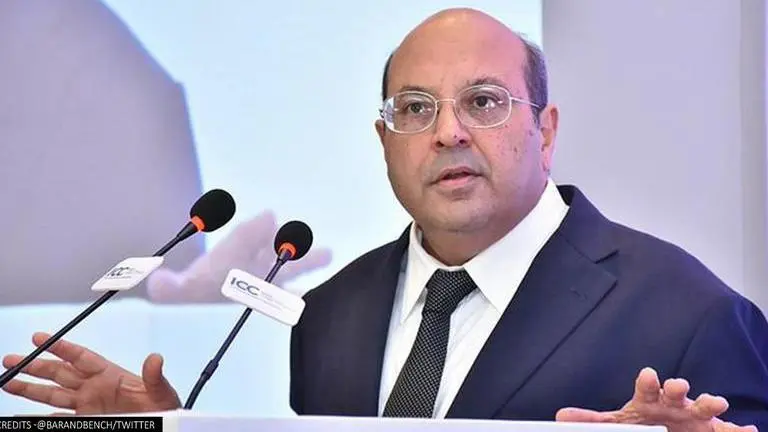Updated 13 August 2021 at 00:21 IST
Supreme Court Justice Rohinton Fali Nariman retires: A look at his landmark judgements
Second in seniority, Justice Rohinton Fali Nariman retired on Aug 12. Bidding a farewell, CJI NV Ramana said that he felt like he was losing 'one of the lions'
- India News
- 5 min read

Concluding a distinguished 7-year career as a judge of the Supreme Court, the Apex court's second in seniority, Justice Rohinton Fali Nariman, retired on August 12. Bidding farewell to him, Chief Justice of India NV Ramana, at an event to mark the occasion, said that he felt like he was losing 'one of the lions that guarded the judicial institution and one of the strong pillars of the contemporary judicial system'. The CJI deemed Justice Nariman as a man of principles who could never mince words.
Although the practice of seniority-based appointments among judges meant that Nariman could not attain the apex designation of CJI, the legal doyen has had a striking and ground-breaking career, to say the least. Rohinton Fali Nariman leaves behind an array of landmark judgements and a rich legacy in his own right.
Rohinton Fali Nariman retires as Supreme Court judge
Justice Nariman was appointed as Solicitor General of India on July 23, 2011, and elevated as an SC judge on July 7, 2014. Nariman belongs to a select company as he was only the fourth senior counsel to be elevated from bar to the bench. He is the son of noted judge Fali Nariman and a postgraduate from Harvard Law School. At the young of 37, in December 1993 he was designated as a senior counsel after the then CJI Venkatachaliah had to amend the court's rules in this regard.
In his 7-year tenure as Supreme Court Justice, he has disposed of over 13,500 cases and delivered historic verdicts. The trove of remarkable judgements by the legal laureate includes the end of a colonial-era Section 377 law that deemed homosexuality a crime, declaration of privacy as a fundamental right and permitting females of all ages to enter Kerala's Sabarimala temple.
Advertisement
As an erudite constitutionalist throughout his career, his contribution in the interpretation of the law via unprecedented verdicts will be etched in the country's legal history with evolving jurisprudence and democracy.
Here's a rewind of impactful judgements by Rohinton Fali Nariman
1. Shreya Singhal Case (abolishing 66A of IT Act)
Advertisement
His earliest judgement that cemented his reputation as a jurist was this case in 2015. A Division Bench comprising Justice Nariman and Justice Chelameswar struck down Section 66A of the IT Act, which empowered police to arrest a person for charges of publishing and posting 'offensive materials' on social networking sites, in view of the section being unconstitutional on grounds of violating the freedom of speech as guaranteed under Article 19(1)(a) of the Constitution. The order stated that the said section threatened the right of the people to question and defend themselves.
2. Shayara Bano vs Union of India (triple talaq abolished)
In a monumental judgement, the SC Bench comprising Justice Nariman made the century-old practice of triple talaq or Talaq-e-biddat unconstitutional in 2017. He had held that gender equality must outweigh religious freedom and the practice is arbitrary as it empowered Muslim husbands to sever conjugal ties under unruly impulses and conferred no room for reconciliation.
3. Aadhaar Card case (Right to Privacy a Fundamental Right)
Amounting to another historic judgement of evolving times, in 2017, the Supreme Court unanimously ruled that the right to privacy was a fundamental right under the Constitution. Nariman was part of the nine-judge Bench of the top court to have passed the verdict which said that privacy is intrinsic to freedom.
4. Adultery de-criminalised
Considered as a remnant of a 158-year-old Victorian law, Section 497 of the Indian Penal Code classified adultery as a punishable offence for men. He struck down the provisions saying it was unconstitutional and fell short of Article 21 (Right to life and personal liberty) and Article 14 (Right to Equality). The order stated that it dented the individuality of women.
5. Homosexuality de-criminalised
In a major relief to the LGBTQ community, a five-judge Bench including Justice Nariman lifted a colonial-era ban on gay sex by decriminalising consensual sexual conduct between adults of the same sex and repealing Section 377.
6. Lifting RBI's cryptocurrency ban
In 2020, a three-judge Bench of the SC led by Justice Nariman lifted the ban imposed by the Reserve Bank of India on virtual currency trading and cryptocurrencies.
7. Sabarimala Temple entry
In 2018, a Bench that included Justice Nariman terminated a long-time prohibition on entries by females into the historic Sabarimala Temple in Kerala. Claiming that the existing ban on women of certain age groups violated their Fundamental Right of Freedom of Religion as Article 25 of the Constitution, his order allowed the entry of women irrespective of age.
8. Cases against MPs and MLAs
In his bid to clean up elections, Justice Nariman directed political parties in 2020 to make public details of criminal cases against its candidates. On August 10, 2021, a Bench headed by him fined nine political parties for not following orders and being guilty of contempt.
9. CCTVs at Central agencies & offices
Protecting human rights, a three-judge Bench headed by Justice Nariman directed the installation of CCTV in offices of central agencies such as CBI, NIA and in all police stations to keep a check on custodial deaths.
August 12 was the last working day of Justice Nariman as a judge of the SC and as is customary, he shared the bench with the CJI in courtroom 1. CJI Ramana said that retirement of people like Justice Nariman who are repositories of legal acumen makes one wonder if age is appropriate criterion to decide tenure of retirement.
Published By : Srishti Jha
Published On: 13 August 2021 at 00:20 IST
